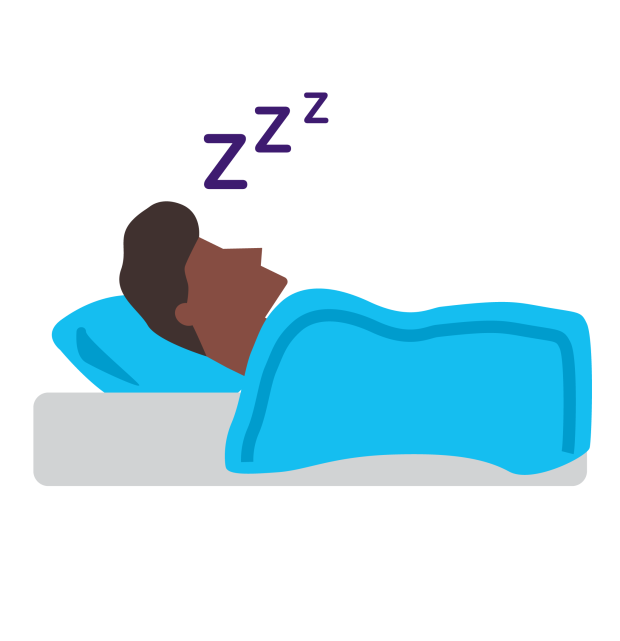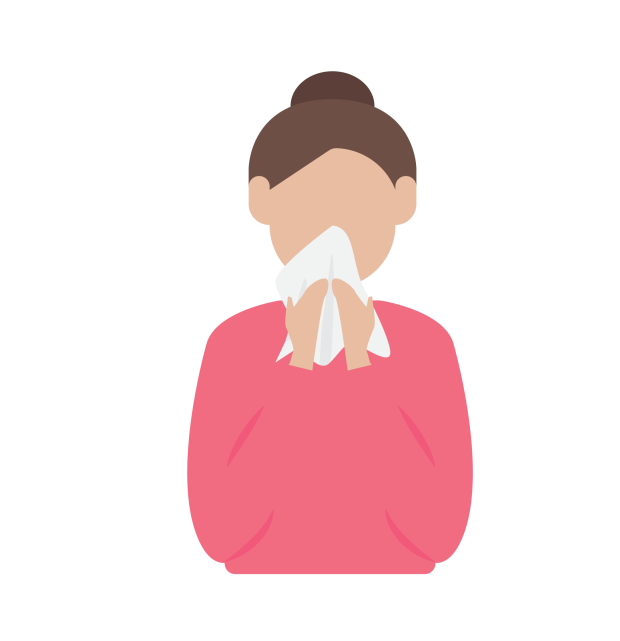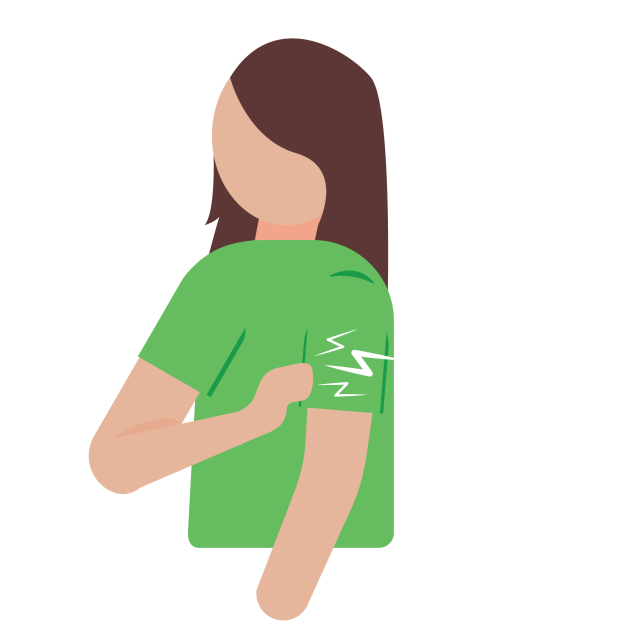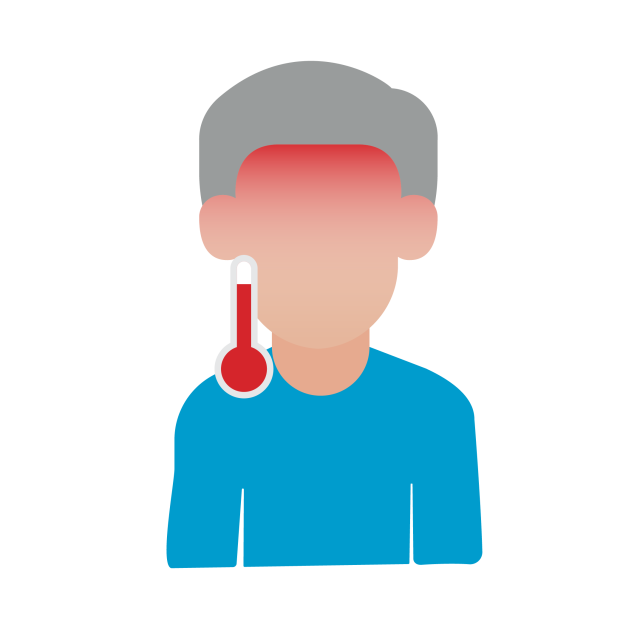Lymphoma symptoms
Symptoms of lymphoma depend on the type of lymphoma and where it is in the body.
This information is about the common symptoms of lymphoma.
If you have one or more of the symptoms outlined in this information, it doesn’t necessarily mean you have lymphoma. Speak to your doctor for advice, and be aware that not all information online is trustworthy.
On this page
What are the common symptoms of lymphoma?
What are local and systemic symptoms?
Difficulty recovering from infections
Thinking, brain and nerve systems
What are the common symptoms of lymphoma?
We outline the common symptoms of lymphoma below. However, it’s important to note that:
- Having one or more symptom doesn’t necessarily mean that you have lymphoma.
- The symptoms described in this information can have other causes.
You might also like to watch our symptoms of lymphoma video.

Swollen lymph nodes
The most common sign of lymphoma is a lump or lumps, usually in the neck, armpit or groin. These lumps are swollen lymph nodes. Sometimes, these are known as glands. Usually, they’re painless. However, rapidly growing lymph nodes can be sore.
Find out more about swollen lymph nodes.

Fatigue
Fatigue is different to normal tiredness. It means feeling exhausted for no obvious reason or feeling washed out after doing very little.

Unexplained weight loss
Losing a lot of weight quite quickly without trying to can be a symptom of lymphoma.
Find out more about unexplained weight loss.

Infections
Getting infections more easily than you usually would and having difficulty getting rid of them can be a symptom of lymphoma.
Find out more about infections.

Sweats
Sweats can happen at any time of the day with lymphoma, but most commonly at night. Some people describe them as ‘drenching’ as they make your nightclothes or bed sheets soaking wet.

Itching
Itching (‘pruritus’) without a rash can be a symptom of lymphoma. It can be very uncomfortable, particularly when you get hot.

Fever
Some people get fevers (temperatures above 38°C or 100.4°F). Fevers often come together with night sweats and weight loss, but they can happen separately. They can also be a sign of infection.
B symptoms
B symptoms is the term used to describe a group of symptoms:
B symptoms can help doctors work out how the lymphoma is affecting your body and how likely it is to respond to treatment.
It is more common to have B symptoms with some types of lymphoma – usually, Hodgkin lymphoma and high-grade non-Hodgkin lymphoma.
‘Local’ and ‘systemic’ symptoms
Symptoms of lymphoma can be:
You might get a combination of these types of symptoms.
Local symptoms
A symptom is described as local when it affects the part or parts of your body that the lymphoma is in, and/or nearby surrounding areas.
The most common local symptom is a swollen lymph node or nodes. Other local symptoms are caused by swollen nodes pressing on nearby structures in the body. For example, if a lymph node compresses a nearby vein that drains the leg, it can cause swelling of that leg.
The symptoms you have depend on where the swollen lymph nodes are. You might have:
- chest symptoms, such as a cough, breathlessness or a feeling of pressure in your chest
- tummy (abdominal) symptoms, such as loss of appetite, feeling full or bloated
- skin symptoms, such as a rash or itching
- swelling in your arms or legs.
Less common local symptoms include:
- pain
- symptoms that affect the brain and nerves, such as fits (seizures), dizziness or weakness in an arm or leg.
Systemic symptoms
Systemic symptoms affect your whole body. They can include:
- weight loss
- fever
- night sweats
- fatigue
- itching
- frequent infections
- shortness of breath.
Systemic symptoms are more common with Hodgkin lymphoma and high-grade non-Hodgkin lymphoma. They are less common in people with low-grade non-Hodgkin lymphoma.
Swollen lymph nodes
Lymph nodes help fight infection. They can become swollen when you are fighting an infection such as a cold.
The most common symptom of lymphoma is a swollen lymph node or nodes. However, there are many other possible causes of swollen lymph nodes. Most people who have swollen lymph nodes do not have lymphoma. Also, a cyst or harmless fatty growth can sometimes look a bit like a swollen lymph node. If you notice a lump that doesn’t go away within 2 to 3 weeks, or you find that a lump is getting bigger, see your GP.
Can my GP tell me if a lymph node is swollen because of lymphoma?
Your GP can examine you to check whether to refer you for further tests and scans. However, it isn’t possible to tell if someone has lymphoma by feeling a lymph node.
Lymph nodes in the neck, armpit or groin are close to the surface of the skin. They are easy to see and feel. However, others that are deep inside the chest or tummy (abdomen), can’t be felt from the outside – they might only be found on a scan.
What are the common features of swollen lymph nodes caused by lymphoma?
Swollen lymph nodes caused by lymphoma:
- are most commonly found in the neck, armpit or groin
- are usually smooth and round
- usually move out of the way when you press on them (are ‘mobile’)
- usually have a ‘rubbery’ texture
- are usually painless – although they can sometimes ache or cause pain in nearby areas (for example, if they’re pressing on a nerve)
- can become very large.
Rarely, swollen lymph nodes can become painful soon after drinking alcohol. This affects up to 5 in 100 people with Hodgkin lymphoma.
If swollen lymph nodes press against blood vessels, it can lower the blood flow through them. This can cause swelling and, in some cases, can increase the risk of a blood clot forming.
Where might lymphoma cause swollen lymph nodes?
Swollen lymph nodes might be in just one area of your body. This can happen with any type of lymphoma.
You might have swollen lymph nodes spread throughout your body (generalised lymphadenopathy). This is more common in low-grade non-Hodgkin lymphoma than Hodgkin lymphoma.
What else can cause swollen lymph nodes?
There are a lot of possible causes of swollen lymph nodes, including:
- infections, such as coughs, tonsillitis, colds, ear and throat infections and glandular fever
- illness that affect the immune system, such as rheumatoid arthritis
- skin conditions, such as eczema or psoriasis
- some medicines, including penicillin, drugs used to treat epilepsy (phenytoin and carbamazepine), cephalosporins (an antibiotic drug) and the covid-19 vaccination.
Fatigue
Fatigue is exhaustion that can be physical, emotional or mental. You might feel tired after doing very little. Sometimes, people describe it as feeling ‘drained of energy’.
Fatigue can be a symptom of lymphoma – there are lots of possible reasons for this. However, there are many other possible causes of fatigue. For example: anaemia (a low number of red blood cells), an underactive thyroid gland, depression, anxiety, chronic fatigue syndrome (CFS or ‘ME’) and glandular fever.
Unexplained weight loss
Unexplained weight loss means losing weight over around 6 to 12 months without trying to.
The NHS advises that you see your GP if you keep losing weight without changing your diet or exercise routine.
How can lymphoma cause weight loss?
Lymphoma can cause weight loss because the lymphoma cells use up your energy resources. At the same time, your body uses energy trying to get rid of the lymphoma cells. In addition, lymphoma and other cancers can make people feel generally unwell and reduce appetite.
Weight loss is more common with fast-growing (high-grade) lymphomas. This is because they put a sudden energy demand on your body, as well as reducing your appetite by making you feel unwell.
Lymphoma is just one of the possible causes of unexplained weight loss. As with many other symptoms, weight loss can happen for a lot of other reasons, such as stress, depression, digestive problems, or an overactive thyroid gland.
Night sweats
Sweats can happen at any time of the day with lymphoma, but most commonly at night. Some people describe them as ‘drenching’ as they make your nightclothes or bed sheets soaking wet.
Any type of lymphoma can cause sweats, although doctors don’t really know why. One possibility is that they happen as part of your body’s reaction to chemicals the lymphoma cells produce. Another is that they are a response to a fever, because sweating is a way of cooling your body down.
Back to top
Itching
Itching caused by lymphoma can affect:
- areas of skin near the lymph nodes that are affected by lymphoma
- patches of skin lymphoma, or skin lymphoma affecting your whole body
- your lower legs
- your whole body.
Itching (pruritus) is much more common with non-Hodgkin lymphoma.
What are the features of itching caused by lymphoma?
Itching caused by lymphoma:
- can be very uncomfortable, particularly in the heat
- can be worse at night in bed
- might also cause a burning sensation.
It’s uncommon to have a rash with it, unless you have skin lymphoma.
Speak to your GP if you have had itching that lasts for more than 2 weeks, or if you have itching that affects your whole body.
If you have a diagnosis of lymphoma and you are struggling with itching, there are things you could try that might help. Speak to your medical team for advice.
Why might lymphoma cause itching?
It’s thought that itching in lymphoma happens when your immune system releases chemicals to try to fight the lymphoma. These chemicals irritate the nerves in yours skin, making it itch.
Itchy skin doesn’t necessarily mean you have lymphoma. It can be a symptom of other, more common causes. These include allergies, skin conditions such as eczema, skin infections or menopause.
Fever
Fever is high body temperature of 38°C or 100.4°F or over. It’s almost always caused by an infection, but there are a few other less common causes, including lymphoma.
What are the common features of fever caused by lymphoma?
With lymphoma, fevers are usually mild (low-grade). This means that they are only a little over normal body temperature. Usually, these fevers come and go.
Lymphoma cells cause your immune system to make chemicals that raise your body temperature, leading to fever.
Contact your doctor if you have a fever that goes on for a while without an obvious infection.
Back to top
Difficulty recovering from infections
Having lymphoma can weaken your immune system.
Usually, white blood cells fight infections. If you have lymphoma, the lymphoma cells (cancerous white blood cells) are produced instead of the healthy white blood cells. This can make you develop infections more easily.
What are the common features of infection caused by lymphoma?
Infections caused by lymphoma:
- could be more severe than they would usually be
- could take you longer to recover from than they usually would
- often cause a high temperature (fever) and make you feel hot and shivery.
Examples of other symptoms of infection include earache, cough, sore throat, pain when you wee, or sickness and diarrhoea – it depends on where in your body the infection is.
See your GP if you’re worried that you’re not getting better after a minor infection.
Chest symptoms
If you have swollen lymph nodes in your chest, they can press on your airways and lungs. They can also cause fluid to collect around your lungs.
What are the common chest symptoms caused by lymphoma?
Swollen lymph nodes in the chest can cause symptoms such as:
- dry cough
- shortness of breath
- noisy breathing
- pain behind the breastbone
- a feeling of pressure in the chest.
These can be worse when you lie down.
If you have a cough or shortness of breath that lasts for more than 3 weeks, speak to your GP.
Swollen lymph nodes in the chest are quite common in Hodgkin lymphoma and some types of high-grade non-Hodgkin lymphoma. However, any type of lymphoma can cause them.
Tummy (abdominal) symptoms
Lymphoma can develop in lymph nodes in the tummy (abdomen) or in your liver or spleen. It can also develop outside your lymphatic system (‘extranodal’ lymphoma). The gut is the most common place for extranodal lymphoma to develop.
What are the common features of tummy symptoms caused by lymphoma?
The symptoms depend on which parts of your body lymphoma affects.
If lymphoma affects your spleen, you might:
- have pain behind your ribs on the left side
- feel bloated or full after eating only a little.
Your doctor might be able to feel the swollen spleen as a lump in the top left side of your tummy.
If lymphoma affects your liver, you might:
- get a swollen tummy
- develop jaundice, which can make the whites of your eyes and your skin get a yellow tinge
- feel bloated, which can happen from a build-up of fluid in your abdomen.
Speak to your GP as soon as possible if your skin or the whites of your eyes look yellow.
If lymphoma affects your stomach, you might:
- have swelling and inflammation of the stomach lining (gastritis), which can cause pain or nausea (feeling or being sick).
- be very anaemic and might pass blood in your poo (stools) or have blood in your sick (vomit blood) if you have stomach lymphoma that leads to tumours in the stomach that bleed.
Speak to your GP as soon as possible if you have sickness (vomiting) that:
- looks green or yellow
- has fresh blood in it, or blood that looks dark brown or black (sometimes described as looking like coffee granules)
- lasts for more than 2 days
- makes you unable to drink liquids without vomiting.
If you have lymphoma in the bowel, you might:
- have tummy (abdominal) pain, diarrhoea or constipation.
Speak to your GP as soon as possible if you have:
- blood in your poo
- a change in bowel habits (such as diarrhoea or constipation) that goes on for more than 7 days.
Pain
Lymphoma itself doesn’t usually cause pain. However, sometimes, swollen nodes press on other tissues and nerves, causing pain. It’s quite common for people with high-grade non-Hodgkin lymphoma to have pain. For example, it can be quite painful if you have tummy (abdominal) disease that’s getting bigger very quickly.
Lymphoma in the bone itself (rather than in the bone marrow) is rare. When it happens, it can cause pain in the affected bone.
Skin symptoms
Lymphoma can cause itchy skin.
Common symptoms depend on the type of skin lymphoma, but could include:
- lumps, which are often a purple colour
- patches of skin that are dry, red, scaly or itchy
- patches of skin that are different to other areas – for example, are flatter, shiny, raised, scaly or red.
If you have skin lymphoma, you might have symptoms that affect your skin. If you’ve been diagnosed with skin lymphoma, you might be interested in our information about living with skin lymphoma.
Speak to your GP urgently if you have a rash that:
- starts suddenly and spreads quickly
- is all over your body
- comes with other symptoms such as pain, fever of breathlessness.
If you have a new rash that doesn’t go away within a few days, seek advice from your GP.
Thinking, brain and nerve symptoms
Any type of lymphoma can affect thinking processes (cognition) such as memory, attention and speed of response. This is known as cancer-related cognitive impairment (‘chemo brain’). Fatigue and psychological factors, such as stress and anxiety, can also have an impact on thinking processes.
Symptoms that affect your brain and nerves depend on where the lymphoma is.
- Central nervous system (CNS) lymphoma is an uncommon type of lymphoma that is in your brain, spinal cord or eyes (your central nervous system, or CNS). Symptoms of CNS lymphoma depend on where the lymphoma is but can include fits (seizures) and can affect balance, memory and concentration.
- Lymphoma that affects the nerves outside of the brain and spinal cord (the peripheral nervous system) can cause peripheral neuropathy. The symptoms of peripheral neuropathy depend on which group of nerves are affected. They can include numbness or ‘pins and needles’, pain, increased sensitivity to touch or temperature, muscles twitches (small muscle contractions).
Tell your GP if you have any of these symptoms.
Swelling in the arms or legs (lymphoedema)
Swollen lymph nodes can stop your lymphatic system from working as it should: it can sometimes block the lymphatic vessels (tubes that run throughout your body and carry lymph fluid). This stops the lymph fluid draining properly from the tissues in your body.
The lymph fluid can then build up, causing lymphoedema (swelling in the tissues of your body).
Possible symptoms of lymphoedema include:
- swelling
- feelings of tightness or heaviness in the affected limb
- aching
- soreness.
Most commonly, lymphoedema affects an arm or a leg, although it can affect other areas of your body, depending on where the lymphoma is.
Other conditions can also cause lymphoedema. For example, infection, injury, genetic conditions and surgery.
If you have any symptoms of lymphoedema, speak to your GP.
Anaemia
Many people with lymphoma are affected by anaemia (a shortage of red blood cells) at some point during their illness. Symptoms of anaemia can include weakness, tiredness, dizziness, headache, fluttering or pounding heart (palpitations), a paler skin tone than is usual for you.
You might develop anaemia if lymphoma affects your red blood cells, for example:
- Lymphoma in the bone marrow can affect the production of healthy blood cells, leading to anaemia.
- Lymphoma in the gut can cause bleeding, which can lead to anaemia.
- If red blood cells collect in the spleen or get destroyed in the spleen, this can cause anaemia.
There are lots of other causes of anaemia, including nutritional deficiencies (particularly iron), heavy periods, pregnancy and some infections.
If you experience symptoms of anaemia, contact your GP.
Frequently asked questions about symptoms of lymphoma
Lymphoma can cause many different symptoms, depending on its type and where it is in your body. The most common symptoms of lymphoma are:
- swollen lymph nodes, usually in the neck, armpit or groin
- fatigue
- unexplained weight loss
- sweats
- itching.
There are over 60 types of lymphoma. These lymphomas can start almost anywhere in the body and can cause many different symptoms. The exact symptoms they cause depend on the type of lymphoma and where it is in the body.
- Even people with the same type of lymphoma can have different symptoms.
- You might have lots of symptoms, few symptoms or no symptoms.
- Sometimes, doctors find lymphoma during tests or scans for something else.
- You might have symptoms in one or more specific areas (local symptoms) or symptoms that affect your whole body (systemic symptoms).
- You might feel generally well or you might become very unwell quickly.
If you are worried about lymphoma and concerned about any symptoms you’re experiencing, speak to your GP.
You might find it helps to keep a note of your symptoms and how they’re affecting you. You could have this with you when you speak to your GP so that you remember everything you want to discuss.
If your GP suspects lymphoma, you might be referred for tests and scans.
If you would like to speak to a member of our helpline team about any aspect of lymphoma, contact us for support.
Although blood test results might suggest the need for further tests, they are rarely the only thing that would prompt your doctor to investigate the possibility of lymphoma. This is because the cells that become abnormal in lymphoma are not usually in the blood – they are in lymph nodes or the spleen.
Speak to a member of your medical team for advice about how to manage lymphoma symptoms. Depending on the symptom and how it’s affecting you, they might be able to offer tips, treatment, or a referral to another health professional.
You might also be interested in our information about coping with symptoms of lymphoma and about living with and beyond lymphoma. However, check with a member of your medical team whether the approaches outlined are suitable for you.
Contact us if you’d like to speak to a member of our helpline team about any aspect of your lymphoma.
